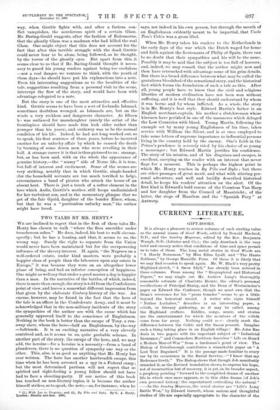TWO TALES BY MR. HENTY.*
WE are inclined to regret that in the first of these tales Mr. Henty has chosen to walk "where the fires smoulder under treacherous ashes." He does, indeed, his best to walk circum- spectly; but he has a leaning, and that, it seems to us, the wrong way. Surely the right to separate from the Union would never have been maintained but for the overpowering influence of the slavery interest. If, again, "the Negroes on a well-ordered estate, under kind masters, were probably a happier class of people than the labourers upon any estate in Europe," it was because they were on an altogether lower plane of being, and had an inferior conception of happiness. One might as well say that under a good master a dog is happier than a man. In the narrative of the battles, of which, indeed, there is more than enough, the story is told from the Confederate point of view, and leaves a somewhat different impression from that given by the elaborate Century history of the war. An excuse, however, may be found in the fact that the hero of the tale is an officer in the Confederate Army, and it must be acknowledged that in the non-military incidents of the story the sympathies of the author are with the cause which has generally approved itself to the conscience of Englishmen. Nothing in the book is better than the escape of Tony, a run- away slave, whom the hero—half an Englishman, by-the-way —befriends. It is an exciting narrative of a very cleverly contrived and, as it seems to us, quite probable scheme. In another part of the story, the escape of the hero, and, we may add, the heroine—for a heroine is a necessity—from a band of plunderers, there is no question of sympathy one way or the other. This, also, is as good as anything that Mr. Henty has ever written. The hero has another hairbreadth escape, this time when he has been arrested as a spy in a Federal camp ; but the most determined partisan will not regret that so spirited and right-feeling a young fellow should not have had to face a shooting-party. If our notice of this book has touched on non-literary topics, it is because the author himself strikes, so to speak, the note,—as, for instance, when he *nit.) indPirtnia; and (2), By Pike and Dyke. By G. A. Henty. says, not indeed in his own person. but through the mouth of an Englishman evidently meant to be impartial, that Uncle Tom's Cabin was a gross libel.
When Mr. Henty takes his readers to the Netherlands in the early days of the war which the Dutch waged for home and faith against the lieutenants of Philip of Spain, there can be no doubt that their sympathies and his will be the same. Possibly it may be said that the subject is too full of horrors ; and, indeed, we may remark that the author might now and then have retrenched with advantage some of his grim details. But there is a broad difference between what may be called the -gratuitous bloodshed of the sensational story, and the historical fact which forms the foundation of such a tale as this. After all, young people have to know that the civil and religious liberties of modern civilisation have not been won without suffering, and it is well that they should understand by whom it was borne and by whom inflicted. As a whole, the story is in Mr. Henty's best style. Edward Martin's father is an English merchant-captain, his mother a Dutchwoman whose kinsmen have perished in one of the massacres which deluged the Low Countries with blood. Young Martin, following the example set by many young Englishmen of his time, takes service with William the Silent, and is at once employed to take some letters of supreme importance to influential persons living in the country held by the enemy. One's faith in the Prince's prudence is severely tried by his choice of so young a messenger ; but Edward Martin justifies his confidence. The story of his mission, and of his disguises and escapes, is excellent, carrying on the reader with an interest that never flags for a moment. This is perhaps the highest point to which Mr. Henty reaches in By Pike and Dyke ; but there are other passages of great merit, and what with stirring per- sonal adventure, and well and lucidly described historical detail, he keeps his readers' attention on the alert. Of the first kind is Edward's bold rescue of the Countess Van Harp and her daughter from the Council of Maastricht; of the latter, the siege of Haarlem and the "Spanish Fury" at Antwerp.


















































 Previous page
Previous page